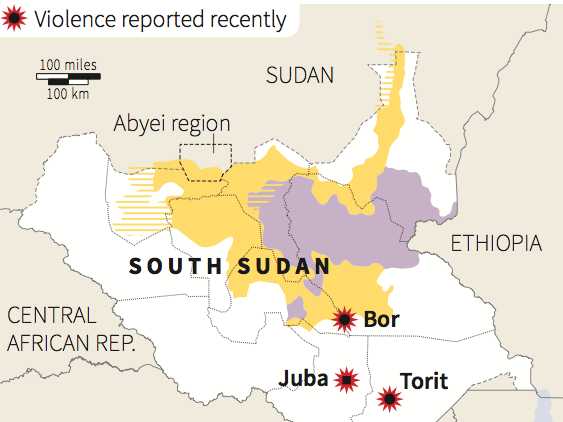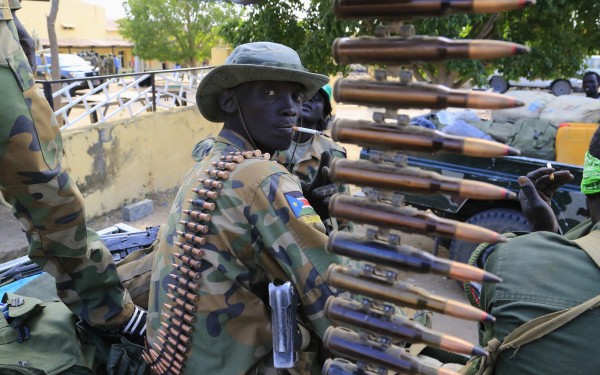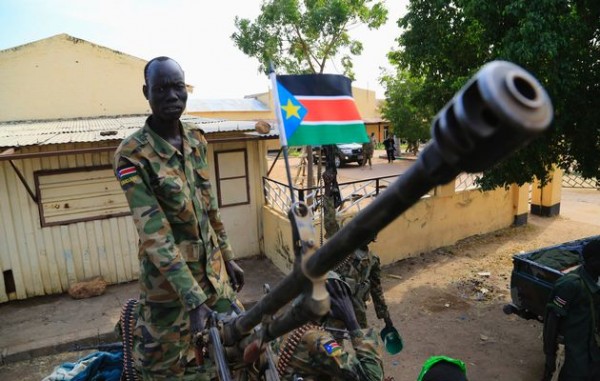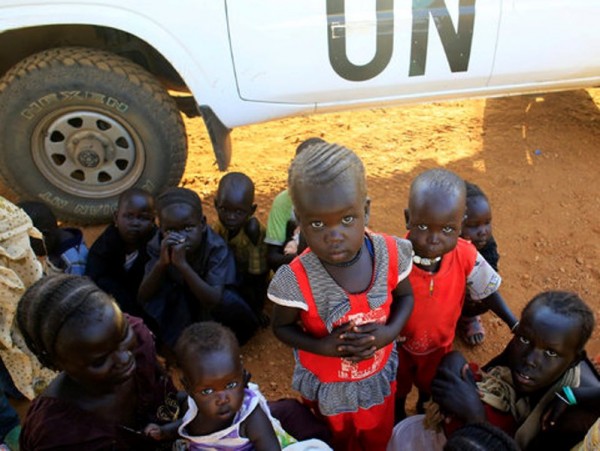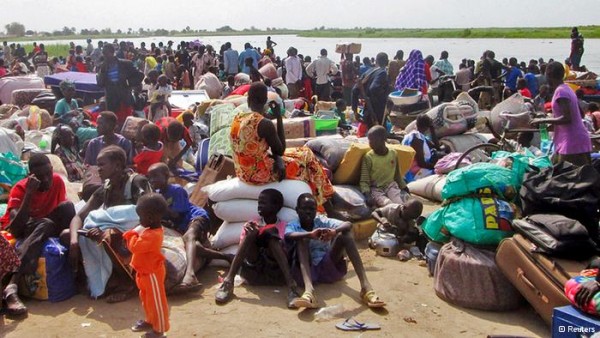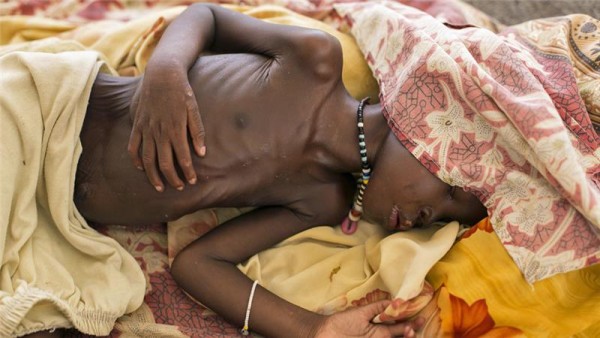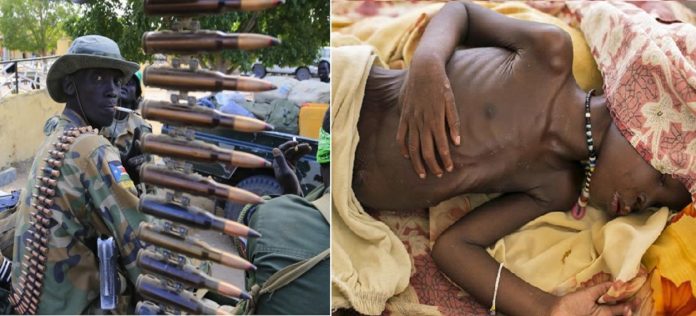
The civil war in Syria has gained prominence in the global media. With the rise of the self-proclaimed Islamic State of Iraq and Syria (ISIS), the country has been turned into a battle ground. Currently, there is a United States led air campaign, and Russian airstrikes against ISIS. Civilians have been badly affected, forcing the majority of them to seek safety in Europe.
However, as the conflict in Syria continues to dominate the front pages, in another part of the world there is another civil war going on. The media has refrained from publishing anything related to this pressing issue. It is amazing. But, as part of our special series of investigative stories, we are turning the spotlight on this country. Read below what has happened—and is still happening—in this country.
South Sudan is the world’s newest nation. It is a landlocked country in northeastern Africa. It covers 619,745 km2 area of land, making it the 42nd largest country in the world—which is much bigger than the 185,180 km2 of Syria.
South Sudan gained independence from the Republic of Sudan on July 9, 2011, after a bloody civil war with the Arab-dominated government in Khartoum. Citizens hoped that this achievement would result in prosperity and would improve their welfare.
However, on December 15, 2013, a little over two years after independence, President Salva Kiir announced that his vice president, Riek Machar, had led a failed coup. He thereafter dismissed Mr Machar as vice president of the country. Since then, the conflict has taken an ethnic course.
President Kiir is from the majority Dinka tribe, while Mr Machar is from the minority Nuer tribe. And because the Dinka people are the dominate force in the government, it is alleged that they (Dinkas) have the upper hand. The Nuers have become the rebels, opposing the government. The International Crisis Group has estimated that the conflict’s death toll could be between 50,000 and 100,000. The war is still going on, and no side is showing restraint. More than two million people are said to have been displaced in neighboring countries. Regional leaders negotiated for a peace deal in August 2015; however, the peace deal has completely broken down.
Although the country is blessed with many natural resources such as petroleum, iron ore, copper, chromium ore, zinc, tungsten, mica, silver, gold, diamonds, hardwoods, limestone and hydropower, the economy of the country is very underdeveloped. The country itself has little existing infrastructure. It also has the highest maternal mortality and female illiteracy rates in the world, as of 2011. The economy of the country is heavily dependent on oil production.
When the country became independent from the Republic of Sudan, it took many of the oilfields. It is estimated that South Sudan has around 4 times the oil deposits of the Republic of Sudan. South Sudan therefore has the third-largest oil reserves in Sub-Saharan Africa.
With little infrastructural development to support other areas of the economy, the government has no alternative than to depend on oil revenues. This has made oil revenues constitute more than 98% of the government of South Sudan’s budget.
And as the oil price at the World Market continues to drop rapidly, and the conflict ravages the country, the economy of the country is in disarray. The local media of South Sudanese reports that since the conflict began, oil production has halved. Some oil fields have been taken over by the rebel forces or damaged by bombardments.
To make matters worse, the South Sudanese government has to pay the Republic of Sudan for the oil being transported through its pipelines. When South Sudan became independent and took many of the oil fields along with it, a deal was reached between the two countries in which South Sudan has to pay $24.1 per oil barrel that is passed through the Republic of Sudan. This is because South Sudan has no pipelines to transport the oil to the seaport for export. Therefore, in order to sell its oil at the World Market, South Sudan must rely on pipelines from the Republic of Sudan.
Businesses are folding up, and many foreign investors are withdrawing their funds due to fear of losing it as a result of the conflict. The country’s currency, the South Sudan Pound, has depreciated badly. Like many African countries, the country relies heavily on imports. As a result, pressure is on International Trading Currencies in the country, especially the United State Dollar.
Some of the local banks in the country have told some media outlets in neighboring Kenya, that the South Sudanese Central Bank does not give them access to the US dollar anymore. And this has resulted in the hoarding of the US Dollar by black marketers.
Those who are working abroad are afraid to send money back home, as the conflict will likely prevent the money from getting to the receivers. This has increased economic hardship on families. The most vulnerable people are women, children, and the elderly.
In August 2015, an anonymous source in the South Sudanese government told Kenyan media that the country has officially asked the International Monetary Fund and the World Bank for financial assistance, but they were told to sign a peace deal first.
According to a report by the Integrated Food Security Phase Classification, because of the conflict, about 3.9 million people face hunger in the country. The report said 3.1 million people are suffering a food crisis. 800,000 people are classified as in ’emergency’ and 40,000 are facing ‘catastrophe’—which has been defined as a stage that is near to death if immediate action is not taken. The agriculture sector of the country has been weakened by displacement and violence in many areas. And the situation is not getting better. It is a complete humanitarian disaster.
The United States and other Western Nations massively supported South Sudan’s quest for independence from the Republic of Sudan. But since the conflict broke out, all these countries have been silent.
Rebel leader, Riek Machar reportedly said that until President Salva Kiir resigns and a transition government is formed, the conflict will not end. President Kiir has also told regional leaders who are trying to negotiate a peace deal, that resignation is not an option on his table.
This has made the future of the underdeveloped country very bleak, dashing the hopes of many who had hoped that independence would lead to greater prosperity through job creation and improvement of social services.
You want to support Anonymous Independent & Investigative News? Please, follow us on Twitter: Follow @AnonymousNewsHQ
This Article (The Country That Has Been Battling A Civil War For Two Years Now – Yet The Media Stays Silent) is free and open source. You have permission to republish this article under a Creative Commons license with attribution to the author and AnonHQ.com


